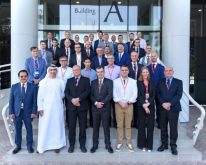 Emirates and IATA hosted a training workshop on the safety of the industry both crew and passengers to share the best practices, especially after the pandemic as travel surges across the globe. An aircraft flight deck can be a complex, challenging and high-threat environment that requires pilots to have intense focus and the ability to react and take informed decisions with agility, aided by technology. As demand for air travel increases phenomenally and airlines expand their operations, pilot training is once again sharply in focus, as they are responsible for the safety of millions of passengers and crew every single day, on every flight, on every route globally. Now more than ever, the aviation industry must use the latest best practices to train its workforce for peak performance. In the first-ever forum of its kind, Emirates and the International Air Transport Association (IATA) jointly held a workshop on pilot training and flight safety for the aviation industry. Hosted by Emirates’ Flight Operations Training together with IATA, the Evidence based training – Competency Based Training Assessment Workshop was organized at the Emirates Aviation College in Dubai on 28 October, 2022.
Emirates and IATA hosted a training workshop on the safety of the industry both crew and passengers to share the best practices, especially after the pandemic as travel surges across the globe. An aircraft flight deck can be a complex, challenging and high-threat environment that requires pilots to have intense focus and the ability to react and take informed decisions with agility, aided by technology. As demand for air travel increases phenomenally and airlines expand their operations, pilot training is once again sharply in focus, as they are responsible for the safety of millions of passengers and crew every single day, on every flight, on every route globally. Now more than ever, the aviation industry must use the latest best practices to train its workforce for peak performance. In the first-ever forum of its kind, Emirates and the International Air Transport Association (IATA) jointly held a workshop on pilot training and flight safety for the aviation industry. Hosted by Emirates’ Flight Operations Training together with IATA, the Evidence based training – Competency Based Training Assessment Workshop was organized at the Emirates Aviation College in Dubai on 28 October, 2022.
Training experts from airlines, including Lufthansa, Singapore Airlines, Iceland Air, UAE Presidential Flight, Etihad, flydubai, Air Arabia and Indigo and civil aviation authorities, such as General Civil Aviation Authority, UAE (GCAA) and the Irish Aviation Authority, attended the workshop. Aircraft manufacturers Airbus and Boeing, as well as the International Federation of Air Line Pilots’ Associations (IFALPA) and training institutions, including Emirates Flight Training Academy (EFTA) and CAE, were in attendance.
Hosted by Emirates’ Flight Operations Training together with IATA, the Evidence based training – Competency Based Training Assessment Workshop was organized at the Emirates Aviation College in Dubai on 28 October, 2022. Covering an entire day of discussions and presentations, industry participants gathered and shared best practice and challenges regarding how to develop, implement and run effective evidence-based (EBT) and competency-based training and assessment programmes.
Speakers from Emirates included: Capt. Bader Al Marzooqi, VP Flight Training; Dr Nicklas Dahlstrom, Human Factors Manager; Capt. David Swarbrick, Training Manager, Boeing and Capt. Stephen Mercer, Flight Training Standards Manager. Other speakers included: Capt. Yann Renier, Head of Training & Licensing, Safety & Flight Operations Division, IATA; Captain Jason Alves, Chief flight Instructor, flydubai; Capt. Olivier Mazzoleni, Deputy Head of Airbus Training Worldwide; Capt. Graham McNally, CBTA Program Lead, Boeing Global Services; Capt. Richard Lenz, Chief Training Captain A380, Lufthansa and Capt. Chris Ranganathan, Chief Learning Officer, CAE.
Capt. Bader Al Marzooqi, VP Flight Training, Emirates, shared: “The forum was a great example of collaboration and partnership with key stakeholders across the aviation industry to increase the efficiency and effectiveness of pilot training programmes. We shared critical insights, information and best practices that will lead to real-world, applicable solutions that positively impact the implementation of evidence based training programmes. The forum was a meeting of minds and a great platform for the industry to come together to discuss common challenges around pilot training. We thank IATA, and everyone who attended and contributed to the forum, for their unstinting support.”
Capt. Yann Renier, Head of Training & Licensing, Safety & Flight Operations Division, IATA, observed: “Emirates Flight training department hosted a Competency- Based Training and Assessment (CBTA) workshop to elaborate on competency based approach of training that includes Evidence-Based Training with more than 40 training managers representing airlines, training organizations and aircraft manufacturers. This event permitted to share latest CBTA development and to identify the main challenges the industry is facing in implementing CBTA and share those with the 80 participants that joined the workshop virtually. I would like to thank the participants that joined us in Dubai and virtually. The workshop illustrates the restart of the operations and I am persuaded that it will be continued in the future.”
Mr. Sham Suddin Bin Khalid, Flight Operations Inspector Air Carrier, and GCAA, said: “The Emirates workshop was a day of reflection and discussion on how best we can train our pilots in the overall interest of aviation safety. A collaborative effort, it was indeed heartening to see the sharing of information and data between stakeholders including airlines, manufacturers and training organisations. We are hopeful that this conversation and cooperation continues in the years to come, contributes to the vision of enhancing pilot competencies and improves the safety record of our industry.”
The workshop discussed various topics, such as how to implement and expand successful EBT and CBTA programmes. Specifically, the challenges with constructing syllabi for such programmes, developing and standardising trainers, as well as managing and making use of training data were addressed. The event aims to be followed by more in order to continue to share best practice and develop pilot training for the benefit of the whole aviation industry.
 Tourism Breaking News
Tourism Breaking News


